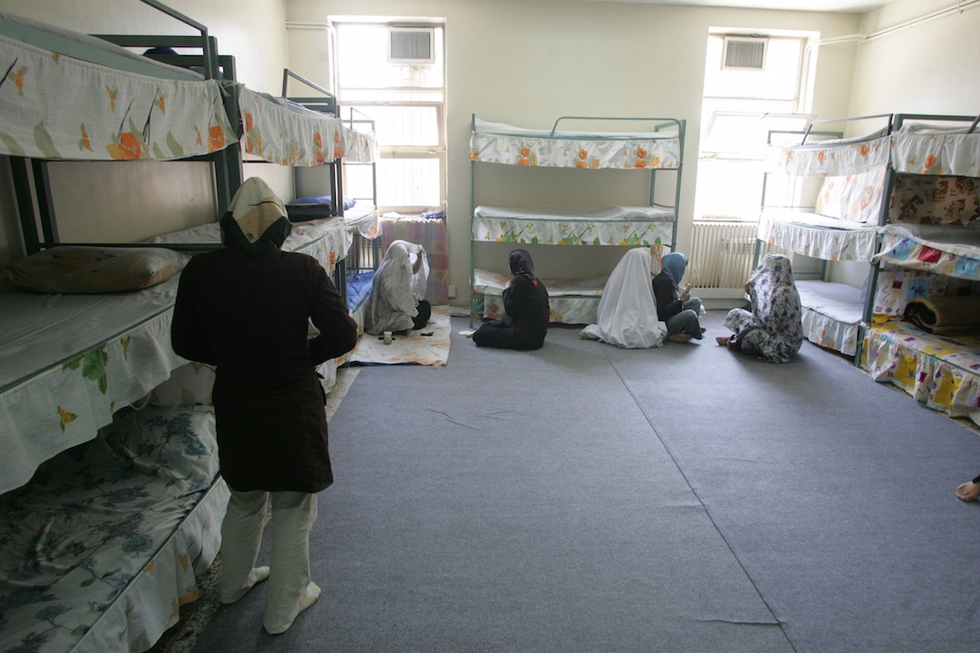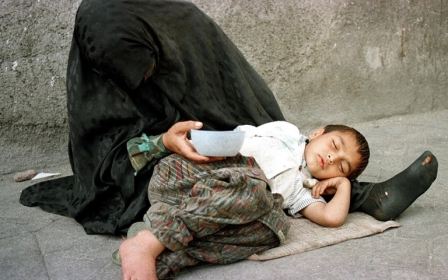Iranian activist ends hunger strike after wife released

An imprisoned Iranian activist has ended a 70-day hunger strike after officials agreed to temporarily release his wife following a public outcry, Iranian media reported.
Their cause won widespread support on social media and protesters rallied on Monday in support of the couple.
Arash Sadeghi, who is serving 15 years in prison on charges of conspiracy, and "publishing false information and propaganda" against the government, launched the hunger strike in protest at his wife's prison conditions.
Sadeghi's wife, Golrokh Ebrahimi Iraee, is serving six years in Tehran's Evin prison for "insulting Islamic sanctities" and "spreading propaganda against the regime". Sadeghi is also detained in Evin.
The couple were originally arrested together in September 2014 at Sadeghi’s workplace in Tehran by men believed to be Revolutionary Guards, Amnesty International reported.
The charges against them relate to an unpublished story written by Iraee depicting the practice of stoning people to death in Iran.
Following a trial, Iraee had her sentence postponed due to a major illness but she was seized again during a raid on her home on 24 October, after which Sadeghi began his hunger strike.
The couple's lawyer, Amir Raeisian, said Sadeghi had given up the hunger strike after authorities agreed on Tuesday to grant Iraee temporary leave from prison.
"Normally it will be five to six days and extendable," he told news agency ISNA. "Arash Sadeghi will also be transferred to hospital for treatment."
The ILNA news agency reported that Iraee's family secured a deposit of five billion rials ($128,000) for her leave.
Speaking to the judiciary-linked Mizan website, Tehran's chief prosecutor Abbas Jafari Dolatabadi on Wednesday confirmed the temporary release and the end to Sadeghi's hunger strike.
He said Iraee could appeal her sentence and noted that under Iranian law, husband Sadeghi was eligible for release after serving seven and half years.
Sadeghi's hunger strike attracted tremendous attention among social media users and high-ranking reformist officials.
Monday's protest saw dozens marching outside Tehran's notorious Evin prison, where the couple was being held.
The hashtag #SaveArash was among the top trends for a few hours on Twitter this week, even though the site is blocked in Iran.
Spreading hunger strikes
The head of the reformist camp Mohammad Reza Aref and outspoken lawmakers Ali Motahari and Mahmoud Sadeghi were among those who voiced concern for Sadeghi's health, according to the reformist Vaghaye daily.
Motahari in a social media post thanked officials for granting Iraee leave and raised the case of another hunger-striking activist, Ali Shariati, whose case was also trending on Twitter on Wednesday.
Shariati is serving a five-year sentence for protesting outside parliament against acid attacks on women and has been on hunger strike for 65 days, Motahari wrote.
"I hope judicial officials resolve this issue wisely to prevent human rights excuses for the enemies of the Islamic revolution," he wrote, posting a photo of a frail-looking Shariati in hospital receiving an injection.
Bill of rights
Last month Iranian President Hassan Rouhani unveiled a landmark bill of rights guaranteeing freedom of speech, protest, fair trials and privacy, in an apparent effort to rally reformist supporters ahead of a re-election bid in May.
Amnesty used Sadeghi's case to highlight the plight of the many Iranian political prisoners currently on hunger strike.
"In recent weeks, a hunger strike crisis in the country’s prisons has brought into sharp focus the callous nature of Iran’s criminal justice system," read a statement released by the organisation on Tuesday.
"Multiple political prisoners, including prisoners of conscience, have felt compelled to resort to hunger strike because they see little hope of legally challenging their unjust imprisonment."
Middle East Eye propose une couverture et une analyse indépendantes et incomparables du Moyen-Orient, de l’Afrique du Nord et d’autres régions du monde. Pour en savoir plus sur la reprise de ce contenu et les frais qui s’appliquent, veuillez remplir ce formulaire [en anglais]. Pour en savoir plus sur MEE, cliquez ici [en anglais].




